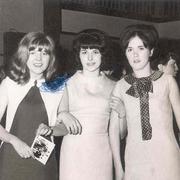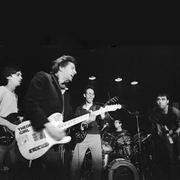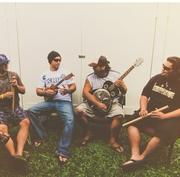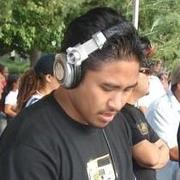Nathen Maxwell And The Original Bunny Gang
| 基本信息 | |||
|---|---|---|---|
| 姓名 | Nathen Maxwell And The Original Bunny Gang | 别名 | 暂无 |
| 国籍 | 美国 | 出生地 | |
| 语言 | 性别 | 组合 | |
| 生日 | 星座 | ||
| 身高 | 体重 | ||
NATHEN MAXWELL
AND THE ORIGINAL BUNNY GANG
WHITE RABBIT - NEW ALBUM IN STORES NOW
There comes a time in his life when each and every man needs to express himself, and for Nathen Maxwell that time has come. For the past thirteen years Maxwell has been leaving his heart on stage as the bassist for the seminal Celtic rock band Flogging Molly, one of the biggest touring punk acts in the world. An accomplished songwriter in his own right, Maxwell has contributed songs to Flogging Molly albums in years past, but things progressed differently when the band went into the studio to record Float, their most recent release. “I played these songs for the band and our singer Dave [King] said, “Nate, you’ve got your own story and I really think you should record these songs,’” Maxwell explains. “Once I got his blessing I figured it’d be bad karma not to record and release them.”
The tracks on White Rabbit were written over the past ten years spanning from when Flogging Molly were playing weekend gigs until more recent days that have seen the act play over two hundred shows a year. However when the group collectively decided that they’d be relaxing their grueling tour schedule in 2009, Maxwell knew that this would be the perfect time to put these tracks to tape. “All I’ve got is music: I’ve got no plan B, no wealthy family members and no savings,” he explains. “But I have these songs and this music I’ve been wanting to do for a decade—and now just seemed like the right time to do it, whereas the last five years haven’t been.” To capture the true spirit of these songs, Maxwell hooked up with his father, who he not only refers to as “his favorite drummer,” but who is also responsible for introducing Nathen to Flogging Molly. “It’s comes full circle musically for my dad and I, and I couldn’t be happier or more proud in returning the favor to him.
In the studio, Maxwell teamed up with long time Flogging Molly producer Ted Hutt (The Gaslight Anthem, Chuck Ragan, Lucero, Bouncing Souls, Street Dogs). “I wanted to record these songs in the most simple and effective way possible,” Maxwell explains, “my guitar playing is very limited to rhythm and my rhythms are really limited to certain strumming patterns and a reggae skank, but aside from that it was really about whatever came naturally.” The result is a refreshingly stripped-down album that fully reconciles Maxwell’s love of rock, reggae and folk music into an honest collection of songs that will appeal as much to fans of Jack Johnson, Manu Chao, and Bob Marley as it will Flogging Molly and the Pogues. “I was a little anxious and stressed out when we went into the studio because it was my first time doing something like this,” he admits, “but in the end it was just an amazing experience.”
This adventurous spirit clearly comes across on White Rabbit from the authentic reggae-feel of “By Your Side” to tender acoustic ballads like “Salt And Sand” and upbeat acoustically driven tracks like “Love Outlaw.” When asked how he was able to reconcile all of his influences into one cohesive collection of songs, Maxwell asserts, “art in my opinion should send a message on behalf of the people - to me that’s what the best art does and that is a common thread throughout this record. That common thread is more important than the scene or style of music,” he continues, adding that discovering Bob Marley—who’s portrait he has inked on his arm—was a huge turning point in his life. “That feeling of solidarity is bigger than punk rock and it’s bigger than reggae and it’s bigger than everything; that’s it for me.” While Maxwell doesn’t like to beat the listener over the head when it comes to his lyrics, he does concede that this project is also a vehicle for him to get his positive message across without risking alienation. “I come from a pretty hardcore punk background and I found that when I put on a hardcore punk record people didn’t want to hear it unless they were already into it—but you put on a reggae record and whether they’re listening to the lyrics or not, people seem to be more open to the music because the approach is a little softer. Maxwell has tried to apply that approach to his own writing over the years, as evidenced on songs like “Walk Humbly Now” and “Working For The Man,” which seem straightforward on the surface, but are bubbling with empowering subtleties. “I just wanted to write some songs that have the message of solidarity without sounding too preachy.”
Ultimately Maxwell would never do anything to take away from playing bass in Flogging Molly—a gig he considers “the best job in the world”—however he couldn’t be more excited to get these songs out into the world and finally allow an audience outside of his immediate family and bandmates to hear them. “I really see this project as limitless,” he explains. “I have this music inside me that is not Flogging Molly music and it was just time get it out into the world,” he summarizes. “Let’s get it out in the universe and see what it does… because I’m up for anything.”
AND THE ORIGINAL BUNNY GANG
WHITE RABBIT - NEW ALBUM IN STORES NOW
There comes a time in his life when each and every man needs to express himself, and for Nathen Maxwell that time has come. For the past thirteen years Maxwell has been leaving his heart on stage as the bassist for the seminal Celtic rock band Flogging Molly, one of the biggest touring punk acts in the world. An accomplished songwriter in his own right, Maxwell has contributed songs to Flogging Molly albums in years past, but things progressed differently when the band went into the studio to record Float, their most recent release. “I played these songs for the band and our singer Dave [King] said, “Nate, you’ve got your own story and I really think you should record these songs,’” Maxwell explains. “Once I got his blessing I figured it’d be bad karma not to record and release them.”
The tracks on White Rabbit were written over the past ten years spanning from when Flogging Molly were playing weekend gigs until more recent days that have seen the act play over two hundred shows a year. However when the group collectively decided that they’d be relaxing their grueling tour schedule in 2009, Maxwell knew that this would be the perfect time to put these tracks to tape. “All I’ve got is music: I’ve got no plan B, no wealthy family members and no savings,” he explains. “But I have these songs and this music I’ve been wanting to do for a decade—and now just seemed like the right time to do it, whereas the last five years haven’t been.” To capture the true spirit of these songs, Maxwell hooked up with his father, who he not only refers to as “his favorite drummer,” but who is also responsible for introducing Nathen to Flogging Molly. “It’s comes full circle musically for my dad and I, and I couldn’t be happier or more proud in returning the favor to him.
In the studio, Maxwell teamed up with long time Flogging Molly producer Ted Hutt (The Gaslight Anthem, Chuck Ragan, Lucero, Bouncing Souls, Street Dogs). “I wanted to record these songs in the most simple and effective way possible,” Maxwell explains, “my guitar playing is very limited to rhythm and my rhythms are really limited to certain strumming patterns and a reggae skank, but aside from that it was really about whatever came naturally.” The result is a refreshingly stripped-down album that fully reconciles Maxwell’s love of rock, reggae and folk music into an honest collection of songs that will appeal as much to fans of Jack Johnson, Manu Chao, and Bob Marley as it will Flogging Molly and the Pogues. “I was a little anxious and stressed out when we went into the studio because it was my first time doing something like this,” he admits, “but in the end it was just an amazing experience.”
This adventurous spirit clearly comes across on White Rabbit from the authentic reggae-feel of “By Your Side” to tender acoustic ballads like “Salt And Sand” and upbeat acoustically driven tracks like “Love Outlaw.” When asked how he was able to reconcile all of his influences into one cohesive collection of songs, Maxwell asserts, “art in my opinion should send a message on behalf of the people - to me that’s what the best art does and that is a common thread throughout this record. That common thread is more important than the scene or style of music,” he continues, adding that discovering Bob Marley—who’s portrait he has inked on his arm—was a huge turning point in his life. “That feeling of solidarity is bigger than punk rock and it’s bigger than reggae and it’s bigger than everything; that’s it for me.” While Maxwell doesn’t like to beat the listener over the head when it comes to his lyrics, he does concede that this project is also a vehicle for him to get his positive message across without risking alienation. “I come from a pretty hardcore punk background and I found that when I put on a hardcore punk record people didn’t want to hear it unless they were already into it—but you put on a reggae record and whether they’re listening to the lyrics or not, people seem to be more open to the music because the approach is a little softer. Maxwell has tried to apply that approach to his own writing over the years, as evidenced on songs like “Walk Humbly Now” and “Working For The Man,” which seem straightforward on the surface, but are bubbling with empowering subtleties. “I just wanted to write some songs that have the message of solidarity without sounding too preachy.”
Ultimately Maxwell would never do anything to take away from playing bass in Flogging Molly—a gig he considers “the best job in the world”—however he couldn’t be more excited to get these songs out into the world and finally allow an audience outside of his immediate family and bandmates to hear them. “I really see this project as limitless,” he explains. “I have this music inside me that is not Flogging Molly music and it was just time get it out into the world,” he summarizes. “Let’s get it out in the universe and see what it does… because I’m up for anything.”
 加载评论内容,请稍等......
加载评论内容,请稍等......













